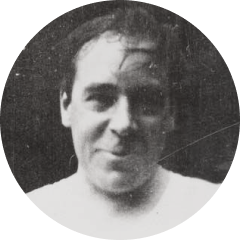Frank Vigor Morley
(1899–1980)
Frank Vigor Morley (1899–1980), son of a distinguished mathematician – his brothers were the writer Christopher, and Felix (editor of the Washington Post) – was brought up in the USA before travelling as a Rhodes Scholar to New College, Oxford, where he earned a doctorate in mathematics. After working for a while at the TLS, he became London Manager of The Century Company (Publishers) of New York. In 1929 he became a founding director of F&F, where he would be a close friend of TSE: for some time they shared a top-floor office at Russell Square. Morley would remark that TSE’s ‘great skill’ as a publisher was that he ‘had an unerring gift for spotting talent, but he would never fight for people. I used to watch, and know him so well that if he quietly suggested publishing the poetry of Marianne Moore, whom nobody knew, I would take up the cudgels and be the loud hailer’ (‘The time when Eliot lit the fuse’, Sunday Times, 8 June 1980).
In 1933 when TSE separated from Vivien, Morley arranged convivial temporary accommodation for him at his farmhouse at Pike’s Farm, Lingfield, Surrey. In 1939 Morley moved to the USA, where he became Vice-President of Harcourt, Brace and Company (and during the war he served on the National War Labor Board in Washington, DC). In 1947 he returned with his family to Britain to take up the post of Director at Eyre & Spottiswoode. A large, learned, ebullient man, he earned the sobriquet ‘Whale’ – though not merely on account of corpulence: in his youth he spent time aboard a whaling ship (he was revolted by the slaughter), and subsequently wrote (with J. S. Hodgson) Whaling North and South (1927) – which was reviewed in the Monthly Criterion by his friend Herbert Read. Other writings include Travels in East Anglia (1923), River Thames (1926), Inversive Geometry (1933), My One Contribution to Chess (1947), The Great North Road (1961), The Long Road West: A Journey in History (1971), Literary Britain (1980); and contributions in verse (together with Eliot, Geoffrey Faber and John Hayward) to Noctes Binanianae (privately printed, 1939).
Morley Kennerley told The Times (25 Oct. 1980) that
one of [Morley’s] hobbies was to work out complicated problems for his friends, and for those baffled there were amazing practical jokes. Convivial lunches with interesting people were a joy to him … He found jobs for many and squeezed me into Fabers where he generously put up with my sharing a corner of his room for some years. I was present all day during his interviews, dictation, visitors and often lunch. How he put up with all this I do not know. His correspondence with Ezra Pound was quite something, and I think he out-Pounded Pound. As his family say, he was a compulsive letter writer and was rarely without a pencil in his hand or pocket.
On 2 July 1978 Morley wrote to Helen Gardner, of Eliot: ‘I loved him, as I think you know, near to the side of idolatry.’
